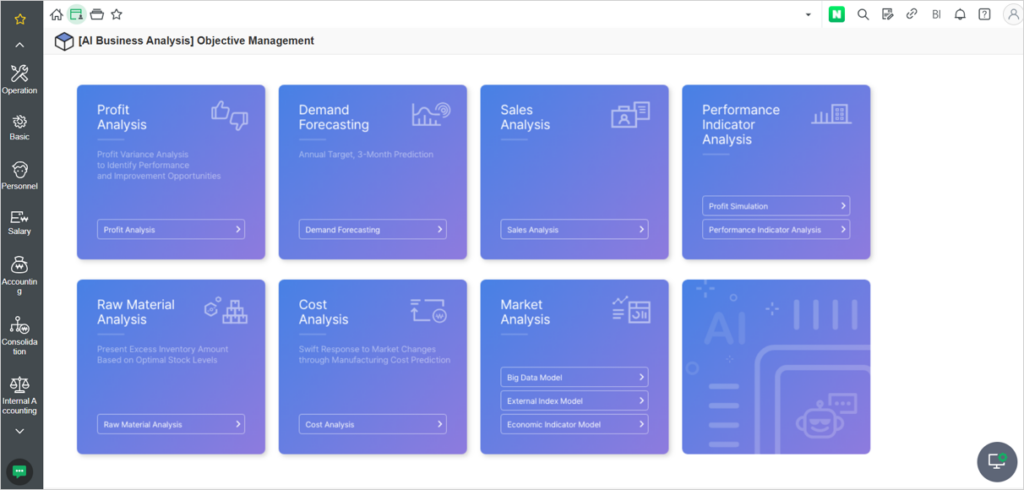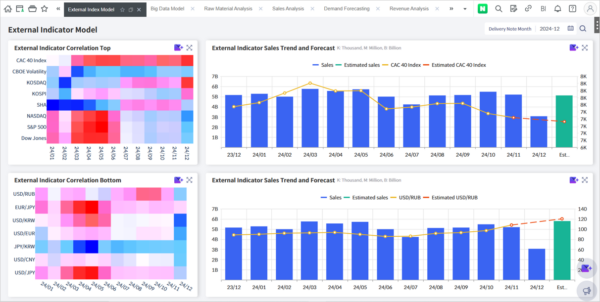Shaping the Future with Data, YLW’s AI Business Analysis

Overview of YoungLimWon Soft-Lab’s AI Business Analysis
YoungLimWon Soft-Lab’s AI business analysis leverages artificial intelligence (AI) technology to automatically process and analyze corporate data, enabling companies to apply the insights to their management strategies. This solution integrates ERP systems with AI algorithms, allowing businesses to analyze data over time (temporal trends) or make decisions based on real-time data. The goal is to transform complex datasets into intuitive and actionable insights, empowering management to use them effectively and easily.
Key Features and Functions
- Real-Time, Data-Driven Decision-Making Support
- The AI engine analyzes a wide range of data stored within ERP systems, such as sales, purchasing, inventory, and accounting, in real time.
- This makes it possible to detect anomalies in specific indicators, conduct predictive analysis, and identify root causes of issues, streamlining decision-making across all operational areas.
- Accurate Predictions and Simulations
- Machine learning (ML) algorithms are applied to deliver automated predictions for revenue growth, financial risk management, and cost optimization.
- Users can run “What-If” simulations to explore hypothetical scenarios, allowing for more deliberate and cautious planning for the future.
- Understandable Reporting with Natural Language Processing (NLP)
- The AI doesn’t just present analysis results as numbers or graphs; it also provides narrative-based insights (through natural language processing), making the findings easy to comprehend for users without technical expertise.
- For example: “Next quarter’s revenue is projected to decline by 10%, primarily due to a decrease in sales from key customers.”
- Anomaly Detection and Alert Systems
- AI instantly detects outliers in corporate data and alerts management of irregularities.
- For instance, it monitors situations such as budget overspending on specific days or significantly low inventory turnover, providing timely notifications and reports to the management team.
- Industry-Specific Solutions
- It offers tailor-made AI analysis modules for industries such as manufacturing, distribution, finance, and services. By using specialized models developed based on the data structures specific to each industry, the solution ensures more efficient analysis and highly accurate predictive results.
- Cloud-Based Integration
- Seamlessly integrates with cloud-based ERP systems, enabling companies to utilize their existing ERP data without significant additional infrastructure costs.
- By leveraging the scalability of cloud technology, computational resource demands are minimized.

Expected Benefits
- Improved Operational Efficiency
- Automating complex and time-consuming data analytics processes allows management and staff to focus on more strategic and high-value tasks.
- Enhanced Decision-Making Accuracy
- Real-time data and AI-driven analysis enable more reliable and strategic decision-making. This results in increased revenue, reduced costs, and better risk management.
- Proactive Risk Management
- Predictive analytics and anomaly detection equip companies to identify risks ahead of time and take preventative action.
- Competitive Advantage
- By leveraging AI to make faster and more precise management decisions, businesses can outperform competitors, establish a stronger market foothold, and build a solid foundation for sustained growth.





